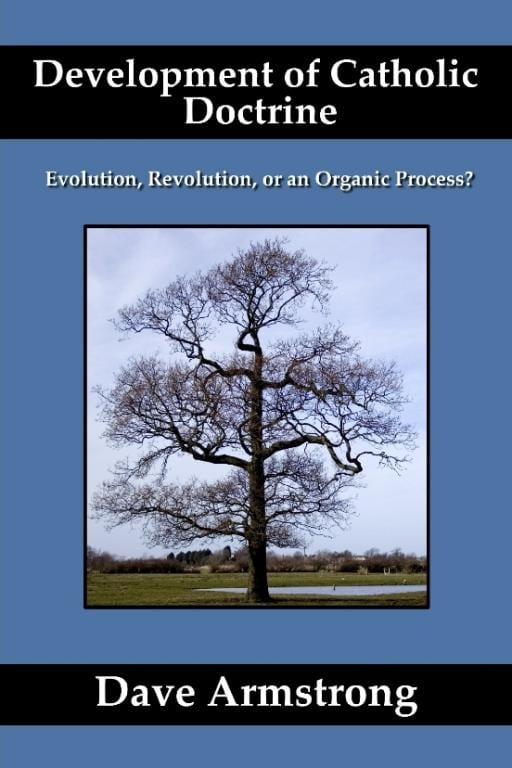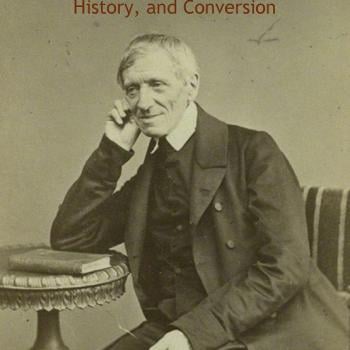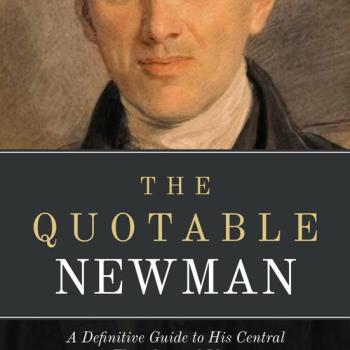
[book and purchase information]
Reply to a Protestant apologist’s comments (in blue) on a public discussion board:
*****
Do you even comprehend that whether Newman’s theory is seen as “development” or “evolution” largely depends on one’s philosophical presuppositions . . . ?
No, because that is a non sequitur. You seem to believe that one’s philosophy almost entirely colors their perceptions of theology, ecclesiology, and Church history. I don’t buy that (not nearly to the extent that you do). I continue to maintain that Christianity is not a philosophy. Faith is not philosophy. And all Christians have faith. To the extent that they do, they are not acting or believing on solely philosophical grounds. Development can be understood as a way to view Church history, without recourse to complicated philosophical discussions.
Consider that for someone who doesn’t believe in “essences” and doesn’t invest “Church history” with the power to legislate belief and practice, a theory that approaches history with such a priorism cannot help but look like a theory that justifies mutation and evolution,
With evolution (at least macroevolution, at any rate), something changes into something else entirely different. Development is like an acorn changing into an oak tree, or a human embryo growing into an adult person: an organic continuity where the essence stays the same even though outward appearances differ. This is not even a Catholic-Protestant issue. Christians of all stripes (i.e., those who think about and respect Church history at all) have always accepted development in some form or other.
The argument between Catholics and Protestants on this is not over whether development occurs at all, but over which doctrines are developments and which are corruptions. Even [anti-Catholic apologist] James White believes that. He (and most Protestants) think distinctive Catholic doctrines are unbiblical, nonbiblical, extra-biblical, and therefore corruptions, and no developments. Catholics think Protestant distinctives are late-arising novelties (as well as unbiblical) and therefore clearly not developments of what came before, as there was no “before.”
This is a standard concept amongst Church historians of whatever stripe. Lutheran (now Orthodox) Jaroslav Pelikan’s views (and admiration of Cardinal Newman) are well-known. Any Church historian you could find accepts the notion of development and understands that it is not evolution. Protestant historian J. N. D. Kelly, for example, starts out his widely-used work, Early Christian Doctrines (San Francisco: Harper, revised edition, 1978) with these words:
The object of this book is to sketch the development of the principal Christian doctrines . . . (p. 3)
He goes on to state that the student of the “patristic age”:
. . . must not expect to find it characterized by that doctrinal homogeneity which he may have come across at other epochs. Being still at the formative stage, the theology of the early centuries exhibits the extremes of immaturity and sophistication . . . it is a commonplace that certain fathers (Origen is the classic example) who were later adjudged heretics counted for orthodox in their lifetimes. The explanation is not that the early Church was indifferent to the distinction between orthodoxy and heresy. Rather, it is that, while from the beginning the broad outline of revealed truth was respected as a sacrosanct inheritance from the apostles, its theological explication was to a large extent left unfettered. Only gradually, and even then in regard to comparatively few doctrines which became subjects of debate, did the tendency to insist upon precise definition and rigid uniformity assert itself. (pp. 3-4)
Likewise, widely respected Protestant historian Philip Schaff. In his General Introduction to his multi-volume History of the Christian Church (Grand Rapids, Michigan: Eerdmans, 1975, reprint of 1910 edition from Scribner’s, New York, p. 10), he writes:
[T]he mind of the Church has gradually apprehended and unfolded the divine truths of revelation, . . . the teachings of scripture have been formulated and shaped into dogmas, and grown into creeds and confessions of faith, or systems of doctrine stamped with public authority. This growth of the church in the knowledge off the infallible word of God is a constant struggle against error, misbelief, and unbelief; and the history of heresies is an essential part of the history of doctrines.Every important dogma now professed by the Christian church is the result of a severe conflict with error. The doctrine of the holy Trinity, for instance, was believed from the beginning, but it required, in addition to the preparatory labors of the ante-Nicene age, fifty years of controversy, in which the strongest intellects were absorbed, until it was brought to the clear expression of the Nicene-Constantinopolitan Creed. The Christological conflict was equally long and intense, until it was brought to a settlement by the council of Chalcedon.
Most Protestant apologists or students of history are well-acquainted with the outlines of Church history and the early theological struggles to define orthodoxy. To reiterate, then: the existence of doctrinal development itself it is not a Protestant-Catholic argument; the real dispute is over which particular doctrines are the legitimate developments.
***
Related Reading
Development of Doctrine: A Corruption of Biblical Teaching? [1995]
Development of Doctrine: He Will Teach You . . . [2-17-91; rev. May 1996]
Overview of Development of Doctrine (TV Interview) [5-1-99]
William Webster’s Misunderstanding of Development of Doctrine [2000]
Catholic Synthesis of Development & “Believed Always by All” [3-19-02]
A Brief Introduction to the Development of Doctrine [8-30-06]
Development of Catholic Doctrine: A Primer [National Catholic Register, 1-5-18]
C. S. Lewis on Inevitable Development of Doctrine [2-17-19]
***
(originally posted on my website on 17 October 2002)
***
Summary: All Christians have always accepted development of doctrine. Catholics and Protestants dispute which doctrines are developments and which are (actually or supposedly) corruptions.
***













